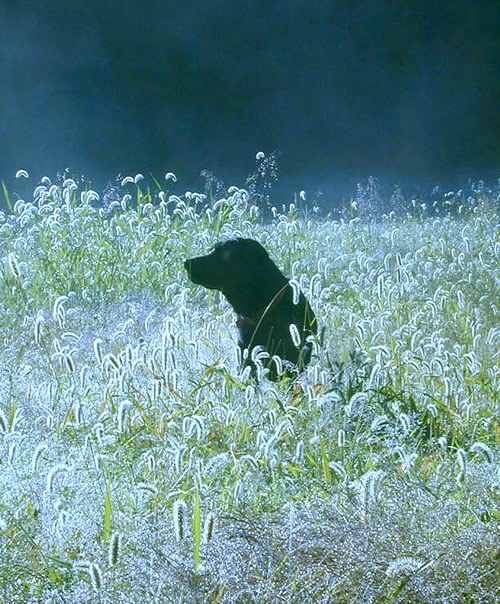Long Way Home

Ann and the children and I moved from our little farm in Wytheville so that I could retrain for a new career. It meant leaving behind our best friend, Zachary, a six year old Black Lab. It was for his own good; he would be miserable penned up in suburban Birmingham. We all agreed that he should remain free to roam and explore the countryside and found friends of friends to take him, far across the county, over a mountain, beyond the interstate. He trembled as he sat beside me in the truck; he had never been more than three miles from home. I left him tearfully, feebly insisting to myself that old Zach did not really care who cared for him, as long as he was fed. He would be fine and we would soon outgrow our mutual loss.
A year later, in our new home in Alabama, a call came from the people who bought our farmhouse back in Wythe County. Ann took the phone. The color drained from her face as the kids and I watched the conversation unfold. Our callers told Ann “There’s a strange dog showed up here a couple days ago. He’s a big black dog, and he stays under the porch here. He’s right thin and his paws don’t look so good. He just seems sort of lost and confused. The neighbors down the road say they think he’s your old dog.” We made more calls and confirmed the truth of this otherworldly reappearance.
Click for enlargement
“It’s Zachary and he found his way home. He’s looking for us and Fred, you have to go get him”, Ann said through tears of joy and guilt. I knew she was right, we had to go. But bringing Zachary there to Birmingham made no more sense then that it would have when we’d left him in Virginia a year earlier. Even so, the next day, driven by forces well beyond reason, my daughter and I drove ten hours to our old farmhouse. It was Zach for sure, though less of him than we left, and ambivalent when he first saw us. He was bedraggled, with some white hair among the black, prematurely old at six doggy years. But he responded to all of the commands he once obeyed, as if we had never been apart.
How often we have wished that this was a world where dogs could talk. He could tell us how he made it more than twenty miles across a mountain range, a very busy interstate, and down many, many country roads through unfamiliar territory to his home. And then, when he finally arrived, we weren’t there. What must he have thought and felt!
His travels had obviously taken him months. And yet he had persisted, driven by the need to find his pack, his neck-huggers and stick-throwers and playmates—his family. It was not enough to get these things from the substitute family of strangers who treated him well enough, but were not his. To leave and find home was a driving need in his mind from that first week in his substitute home. After waiting and waiting, he finally knew I was not coming back for him, and he would have to make the trip back to us on his own.
Zach stayed with us through two more relocations. Finally, at age 12, elderly in dog years, he had become decrepit, uncomfortable and incontinent. Each day was a misery for him. We made the decision to send him out of this world painlessly. It was a tough thing to do. But I think, looking back, that euthanasia was an easier decision than the decision we made to leave our good friend with strangers, thinking he would never see us again, and knowing he would never rest until he found us.

